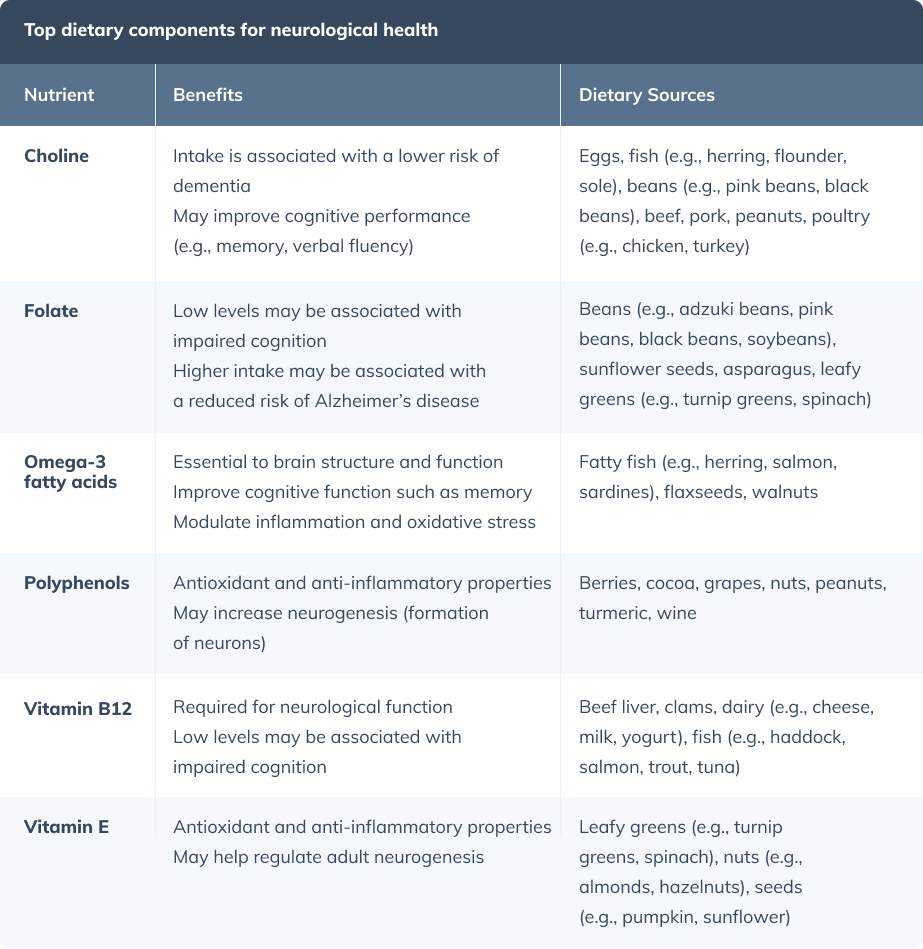According to the National Institutes of Health, Alzheimer’s disease is the most prevalent neurodegenerative disease, affecting an estimated 5.4 million individuals in the United States in 2016. (15) While the risk of developing a neurodegenerative condition increases with age, these diseases are not necessarily a normal part of healthy aging. (23)
Genetics are estimated to account for only about 25% of differences in the aging process between individuals. This suggests that environmental factors and lifestyle choices play a significant role in the aging process and patterns of neurodegeneration. (10)
Read on to learn more about the different types of neurodegenerative diseases and the strategies you can use to improve your neurological health.
What are neurodegenerative diseases?
Neurodegenerative disease is an umbrella term for health conditions that involve the progressive decline of brain health and cognitive functions. These conditions have been characterized by impaired neurogenesis, the process by which neurons (nerve cells) are produced, resulting in a loss of neurons, as well as cognitive and motor disabilities. (18) Common neurodegenerative conditions are summarized below.

Dementia
Dementia is a group of medical conditions characterized by a deterioration of cognitive function. In individuals with dementia, abnormal brain changes result in altered behavior and a decline in thinking, memory, and the ability to perform regular tasks. Dementia is not considered a normal part of aging. Common forms of dementia include Alzheimer’s disease, vascular dementia, Lewy body dementia, and frontotemporal dementia. (23)
Alzheimer’s disease
Alzheimer’s disease (AD), the most common form of dementia, is characterized by a buildup of neurofibrillary tangles and Aβ deposits in the brain, as well as global cognitive decline. AD is subdivided into early-onset familial AD, which typically presents itself at ages younger than 65 years old, and late-onset AD, which makes up the majority of cases and typically presents at age 65 or older. A common genetic risk factor, the ε4 allele of the apolipoprotein E gene on chromosome 19q13 (APOE-ε4), is associated with late-onset AD. (2)
Lewy body dementia
Accounting for approximately 15% of cases, Lewy body dementia (LBD) is the second most common form of dementia in elderly individuals. LBD presents with a number of clinical symptoms, including visual hallucinations, progressive cognitive impairment, and parkinsonism, the group of symptoms present in Parkinson’s disease. (2) A prominent feature of LBD is the buildup of alpha-synuclein proteins, referred to as Lewy bodies, inside of nerve cells. (1)
Parkinson’s disease
Following dementia, Parkinson’s disease (PD) is the second most common adult-onset neurodegenerative condition, with an average onset between 50 and 60 years of age. PD is characterized by Lewy body deposits and a decrease in neurons that release the neurotransmitter dopamine. PD is a progressive movement disorder with three typical symptoms: tremors, rigidity, and bradykinesia (slowness of movement). (2)
Multiple sclerosis
Multiple sclerosis (MS) is a progressive disease characterized by the degeneration of myelin, the protective layer or sheath covering nerve fibers. (12) Inflammation may contribute to the central nervous system damage seen in MS. (22) Individuals with MS experience a variety of symptoms, including sensory changes, weakness, visual changes, coordination problems, and spasticity. (8)
Common risk factors for neurodegenerative disease
Neurodegenerative diseases share certain common causes and risk factors. For example, genetic mutations are present with Alzheimer’s disease (AD), Parkinson’s disease (PD), and in frontotemporal dementia (FTD) with parkinsonism.
While aging and family history are unmodifiable risk factors for neurodegenerative conditions, (2) certain environmental and lifestyle factors may also contribute, including:
- A Western-style diet high in fat and sugar (18)
- Oxidative stress and neuroinflammation (18)
- Nutrient deficiencies (e.g., folate, vitamin B12, vitamin D) (11)(16)(17)
- Physical inactivity (9)
- Lack of cognitive stimulation (5)
- Central adiposity (accumulation of fat around the abdominal area)(6)

Top 4 strategies for preventing neurodegenerative diseases
Lifestyle changes can be made at any age to help optimize cognitive function and prevent neurodegenerative conditions. Examples of lifestyle choices that can help to reduce the risk of neurodegenerative disease include regular physical activity, a healthy diet, intake of certain dietary supplements, adequate sleep, and engaging in cognitive activity.
1. Physical activity
Regular physical activity may have a protective effect against dementia and Parkinson’s disease. (21) A systematic review found that low-intensity physical activity, such as walking, was associated with a reduced risk of dementia and Alzheimer’s disease. In one of the included studies, a reduced incidence of dementia was seen in individuals who exercised for at least 15 minutes, three times per week. (20)
2. Diet and supplementation
Including an abundance of whole foods in your diet can help optimize cognitive function and protect your nervous system. The following table summarizes some of the top neuroprotective nutrients, as well as their benefits and common dietary sources.

Additionally, several dietary supplements have been shown to prevent neurodegenerative conditions and cognitive decline, including:
- Acetyl-L-carnitine (Alcar) (13)
- Cobalamin (vitamin B12) (14)
- Curcumin (19)
- Folate (vitamin B9) (6)
- Omega-3 fatty acids (3)
- Phosphatidylserine (7)
- Vitamin D (11)
We suggest speaking with your integrative healthcare practitioner before taking new supplements.
3. Sleep
Changes to sleep patterns, commonly experienced by aging adults, may play a role in cognitive decline and the development of certain types of dementia. Sleep disturbances that may impact cognitive performance include sleep duration that is either too short or too long, and changes in sleep duration. (26) The Centers for Disease Control and Prevention (CDC) recommends that adults obtain seven hours or more of sleep per night. (4) Natural sleep aids may help to improve the quality or duration of sleep.
4. Cognitive activity
Research suggests that cognitive training for executive functions may help support brain function and reduce the risk of neurodegenerative disease. A higher level of cognitive activity has been associated with a 50% reduction in the risk of developing dementia in the following four to five years, as well as a delay in the onset of symptoms in individuals who do develop dementia. Cognitive activity may include leisure activities (e.g., chess, crossword puzzles, using a computer, playing an instrument), advanced educational attainment, and cognitively stimulating careers. (5)
The bottom line
Neurodegenerative conditions, including dementia, Alzheimer’s disease, and Parkinson’s disease, are not necessarily a normal part of aging. Common lifestyle factors may be associated with an increased risk of these diseases, such as a Western-style diet and physical inactivity. You can reduce your risk of developing these conditions by incorporating some of the protective lifestyle habits outlined in this article. If you’re a patient, always speak to your healthcare practitioner before taking supplements or making significant changes to your diet or lifestyle.

